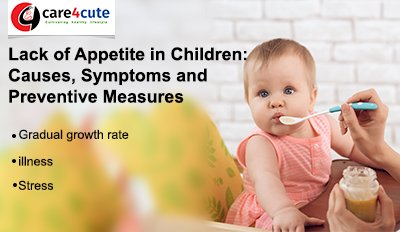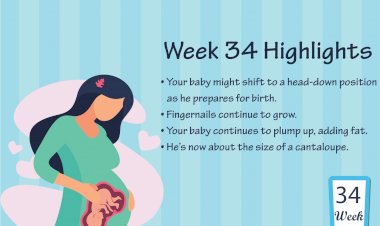Lack of appetite in children: causes, symptoms and preventive measures
If your child is facing health issues related to Lack of appetite, here is the proper information that include Lack of appetite in children: causes, symptoms and preventive measures.

Parents often complain about loss of appetite in their children. However, it is quite normal for children between the age of two to five. But in some case, it could be a matter of concern. Here, this article tells you about the possible causes for the loss of appetite in children, measures to regain it, and supplements that might help to regain it.
When Should You Worry?
If your child has normal weight and height (for their age), then there is no need to worry, as some children with a small built might have lesser food requirements and, therefore, a lesser appetite. But if your child is older and the loss of appetite is sudden, accompanied by weight loss, then you should consult a pediatrician to find out the reason and cure it.
Possible Causes For Loss Of Appetite In Children
If your child is always tired and irritable, then a lack of appetite could be a reason or it.Here are a few possible causes why children might lose their appetite:
1. Gradual growth rate
Change in growth rate can cause an appetite loss in children. During the first year, children grow rapidly. But after that, the growth becomes gradual and they may need less food. During this period, a decline in appetite is pretty normal. Infact, in the second year of life, children only require to put on 2.3kg and 12 cm as opposed to 7 kg and 21 cm in the first year.
2. illness
Illness can often result in a significant loss of appetite in children. If your child is facing any ailment like a sore throat, stomach flu, diarrhea, headache, fever, or other symptoms, then they may may have less desire to eat than what they usually have. Fortunately, most children regain their appetite when they get better.
3. Stress
Stress can have many adverse effects including loss of appetite, on young children . If you see that your child is losing interest in eating or having a hard time in sleeping, then stress could be the reason behind it. To address your child’s poor appetite, you need to find out the cause of stress and alleviate it. Some possible causes of stress during childhood are:
● Family issues like death of someone in the family, death of a pet or the birth of a sibling
● Bullying
● Inability to handle academic pressure and the impractical expectations of parents
● Depression
Depression could be another reason for a child’s loss of appetite. Most parents mistake depression for sadness. But sadness and depression are not the same. Feelings of sadness go away with time, but depression does not. Depression not only makes the child sad but also interferes with their normal life.
If your child experiences a significant lack of interest in activities that they previously enjoyed, then they may be depressed. A change in eating habits could be a strong sign of depression. It is advisable to seek medical advice if you are concerned .
● Anorexia nervosa
Sometimes, in a bid to emulate/ copy their screen idols and for several other reasons, children develop a psychological indifference to eating. They try to remain without eating for as long as possible. Even when they eat, they choose low-fat foods and later feel disgusting about eating them. Genetics, brain chemical imbalances, and developmental issues can also cause anorexia nervosa.
If your child is showing aversion to food or exercising more than it should, while losing weight drastically, they may be suffering from anorexia nervosa. An eating disorder specialist can tell you how to help your anorexic child regain a healthy appetite.
● Medications
If the child has been on a course of antibiotics recently, this could affect their appetite. Many other medications could also affect appetite.
● Anemia
Anemia is another possible cause of a loss in a child’s appetite. Children with anemia seem lethargic, tired, and irritable. If not untreated, anemia can adversely affect your child’s development and school performance . Get a blood test done if you suspect that your child is suffering from anemia.
Intestinal worms
Intestinal worms can cause decrease of appetite in children. Worms enter into a child’s digestive system and stay there as parasites, cuasing intestinal bleeding, loss of appetite, dysentery etc. Deworming medicine can be taken from your pharmacist or doctor. If you have pets in your house, deworm them twice a year and deworm your children after the age of two atleast once a year or as recommended by your pediatrician .
● Constipation
Irregular bowel movements in children can result into constipation. A loss of appetite in children could cause constipation. A symptom of constipation is hard stools.
In addition to the above causes, there could be some other reasons for the loss of appetite in children such as authoritative parenting, how much food the mother offers, family meals, socioeconomic status, and fear of trying new foods.
Measures To Improve Your Child’s Appetite
Here are some natural methods to increase your child’s appetite. We have also listed a few supplements that can be beneficial.
● Children like to eat snacks. But these snacks should be as healthy as meals. Make smart food choices. For example, give the child roasted peanuts instead of crisps and sandwiches or baked veggies instead of cookies.
● Do not allow them to eat snacks when it is time for meals; maintain a consistent time gap between both.
● Peanuts help in appetite-boosting and protein-building, hence provide more peanut-based foods to your child’s diet.
● If your child denies to drink milk, add calcium to their diet in the form of cottage cheese, yogurt, cream, and curd. You could also use non-dairy milk if they prefer that.
● If your child has a reduced appetite, offer smaller bites of food until they start eating properly on their own. Smaller quantities help in increasing metabolism and increase the appetite.
● Prepare a list of the nutritious items your child likes to eat and provide the meals to suit their tastes. When your child will find their favourite food on the plate, he/she will start showing interest in eatings.
● select healthy, calorie-thick foods to increase weight.
● Some herbs and seasonings such as ginger, cayenne, and ginger work as appetite stimulants. Sauted herbs and spices in olive oil before mixing them to a meal for added flavor are always good.
● It is condidered that lemon juice, ginger, and vinegar might stimulate gastric secretions and one’s appetite .
● Try to introduce new foods and flavors slowly so that your child would be accustomed to their tastes.
If your child’s appetite is not back to normal, even after adopting all these measures, then it is better to take the advice of a pediatrician as there could be an underlying medical reason. Also, do not punish or scold your children for not eating enough. Instead, observe their eating patterns and try to identity the cause for the decreased appetite.
Sometimes the child might be eating right for their age and exceeding parental expectations might cause worry in parents. So, evaluate your doubts with your child’s doctor.
Tips That Will Do Help In Preventing A Loss Of Appetite In Children
Here are some points to be kept in mind:-
1. Make the meals tasty and interesting and a visual treat for your children.
2. Never scold or argue with the children while taking meal.
3. Prepare the meal schedule and serve food only when your child is hungry.
4. Always encourage your child to make healthy food choices.
5. Serve small portions at regular intervals.
6. Encourage your child to be physically active.
7. Do not compel your child to eat if he/she is not hungry. Forcing to finish the food on the plate is also a bad idea.
Lack of appetite can adversely affect the child’s growth and development. So, if you feel your child has not been eating properly, first observe their eating patterns. Monitor their height and weight to see if they are below the normal range. If the change is due to improper eating habits, then take steps to cure it.
Next, we will tell you about a few appetite stimulants which help in improving your child’s appetite. However, use them only when all the other options do not work.
Appetite Stimulants For Children
There are many natural methods to boost your child’s appetite. But sometimes you may need to use appetite stimulants to ensure that the children eat as much as they should. Though these appetite stimulant drugs are available over-the-counter, there are no well-researched studies to back their safety for children .So, do consult a doctor before giving them to your child.
1. Duocal
Ingredients: Hydrolyzed cornstarch, blend of refined vegetable oils (corn, coconut), medium-chain triglycerides (fractionated coconut oil, palm kernel oil), mono and diglycerides, diacetyl tartaric acid esters of monoglycerides.
Nutritional value: Per 100g minerals such as sodium (<20g), potassium (<5g), chloride (<20g), calcium (<5g), phosphorus (<5g)
What it has: It is a powdered energy source containing a blend of carbohydrates and fat for children who lack appetite and are low in weight.
2. Komilon Appetite Supplement
Ingredients: Purified water, sorbitol, propylene glycol, xanthan gum, sodium saccharin, methylparaben, propylparaben, and sodium benzoate(preservatives).
Nutritional Value: Serving size 1 teaspoon
Amount per serving: Vitamin C 20.00mg, Thiamin 1.36mg, Riboflavin 1.36mg, Niacin 6.26 mg, Vitamin B6 1.36mg, Vitamin B12 1.24 mg
What it has: Komilon dietary supplement has Vitamin C, which aids in the overall growth and development of body tissues, whereas Vitamin B12 triggers the activity of essential enzymes in the body.
3. Emergen-C Kidz Dietary Supplement Drink Mix
Ingredients: Fructose, citric acid, maltodextrin, malic acid
Nutritional value: Vitamin C, riboflavin, vitamin B6, vitamin B12, thiamine (vitamin B1), niacin (vitamin B3, folic acid, pantothenic acid (vitamin B5)
What it has: It has 1,000mg of vitamin C, plus other antioxidants. It has no caffeine and replaces vital electrolytes lost through sweat.
Tonics such as Kid’s Care syrup to improve overall health, digestive system, and appetite.
Always keep in mind that it is quite normal for children to lose their appetite, so no need to be panic every time it happens. If your child is healthy, happy, and can sleep well, then there is nothing to worry. But a prolonged loss of appetite do requires medical advice. So, keep an eye on your child’s eating habits.
If you have any tips about how to deal with a child’s poor appetite, your experience and suggestions are always welcome in the comments section.



































Comments (0)